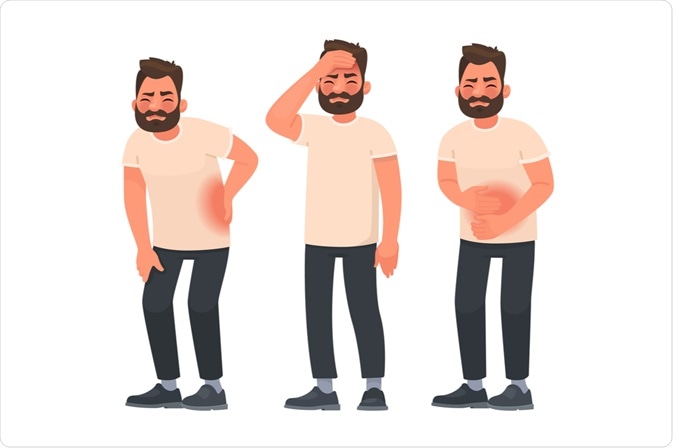Somatization refers to the expression of psychological or emotional problems as physical (somatic) symptoms. A common example is a headache being brought on by stress.
 Image Credit: tynyuk / Shutterstock.com
Image Credit: tynyuk / Shutterstock.com
What are somatoform disorders?
Somatization can give rise to a group of disorders broadly referred to as somatoform disorders, which may be characterized by chronic and severe symptoms. People experiencing these disorders often find their symptoms highly distressing, which can significantly impact their social and occupational lives. Sufferers often do not agree that their symptoms have underlying psychological roots; instead, they feel sure that the symptoms are the result of a physical problem.
The somatoform disorders include:
- Somatic symptom disorder (SSD)
- Hypochondriasis
- Conversion disorder
- Body dysmorphic disorder (BDD)
SSD
People with SSD experience many different physical symptoms including:
- Nausea
- Headache
- Abdominal pain
- Bowel complaints
- Menstrual problems
- Fatigue
- Sexual dysfunction
People with SSD become so focused on their symptoms that they can become severely distressed and experience difficulties with daily life or may even suffer disability. The extreme anxiety sufferers experience over their symptoms leads them to frequently make doctor appointments.
Examples of excessive thoughts, feelings, and behaviors associated with SSD include:
- Extreme anxiety over potential illnesses
- Believing regular physical sensations are a result of a serious condition
- Seeing physical sensations as harmful and problematic
- Suspecting that medical assessments and treatments have been inadequate
- Worrying that physical activity can be damaging to the body
- Frequently checking the body for abnormalities
- Failure to be reassured by healthcare visits
- Unresponsiveness to treatments
- An impairment that is more severe than would usually be expected in response to a medical problem
Hypochondriasis
Also called hypochondria, hypochondriasis refers to an overwhelming suspicion a person has that they are seriously ill, despite healthcare providers being unable to find any evidence of health problems. People with this disorder interpret normal physical sensations as symptoms of severe disease, meaning they become overwhelmed with fear that is often extreme and ongoing. This can cause problems functioning in their relationships, both socially and at work.
People with hypochondriasis often focus on pain felt in the neck, head, and trunk. Around 80% of individuals suffering from hypochondriasis are estimated to also have another psychological disorder such as depression or anxiety.
Some of the signs indicative of a person with hypochondriasis include:
- Being overly concerned about serious illness for at least 6 months
- Misinterpreting normal physical sensations as signs of severe illness
- Failure to feel reassured by healthcare professionals that no medical problems are present
- Difficulty maintaining relationships, social life, and a job
- Difficulty performing day-to-day activities
Somatic symptom disorder - causes, symptoms, diagnosis, treatment, pathology
Conversion disorder
Conversion disorder is a psychological condition where a person has nervous system symptoms, despite the lack of any medical condition that can explain the symptoms. Examples of the symptoms these individuals may experience include the following:
- Paralysis
- Blindness
- Loss of speech
- Deafness
- Numbness
The symptoms are thought to occur in response to an internal conflict. A person may feel the urge to strike someone, for example, but because they feel that such a response is wrong, they experience numbness in their arms.
Common signs that a person has conversion disorder include:
- Sudden onset of a debilitating symptom
- Not being as concerned as a person usually would about a severe symptom
- History of a mental disorder that resolves once symptoms emerge
BDD
In BDD, a person is preoccupied with how they look and may focus on a self-perceived “defect” that is not apparent to other people. Or they may indeed have a defect, but their concern about it is extreme. For example, a skin blemish that most people would consider trivial can become a major preoccupation for a person with BDD, and they may spend excessive amounts of time examining it with a mirror or go to great lengths to conceal it.
The problems experienced with BDD vary from person to person, but common signs of the condition include excessive worrying that one or more body parts are:
- Not in proportion
- Disfigured
- Asymmetrical
- Too large or too small
Commonly, the body parts with which a person with BDD becomes preoccupied are:
- Skin
- Hair
- Chin
- Lips
- Nose
- Genitals
Such obsessions and behaviors can lead to severe emotional distress that interferes with their daily life. Some individuals with this condition find it difficult to be among other people or to go out in public.
References
Further Reading
Last Updated: Apr 25, 2021